Ever wondered how to keep your wood gleaming without harsh chemicals? Enter the zesty world of lemon oil for wood—nature’s secret to vibrant finishes!
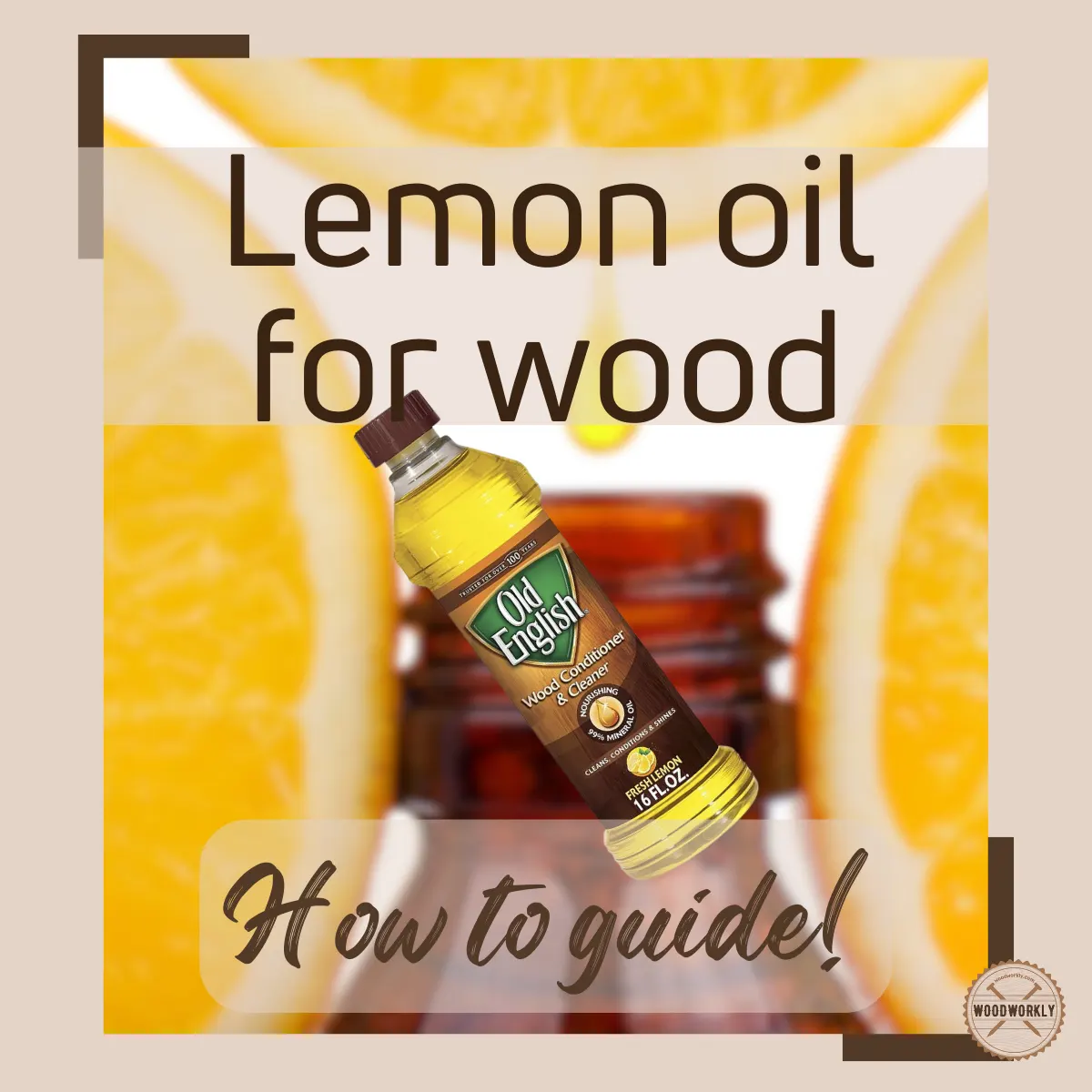
I really like how lemon oil smells. It’s great for making things around the house look shiny and clean.
People who know a lot about cleaning say that lemon oil is one of the top choices for cleaning furniture because it’s so good at getting rid of dirt.
Have you ever tried using lemon oil for wood? If you haven’t, you’ll want to read this article. It will tell you about all the good things that can happen when you use lemon oil on wood.

I’ve used lemon oil for a long time, and I want to share what I’ve learned about how it can help wood look its best
Can you use Lemon oil for wood,
Yes, you can use lemon oil for wood to restore the depth of grain and inherent beauty by cleaning, polishing, and conditioning the wood. Lemon oil protects wood from moisture and keeps wood from cracking and drying out. Lemon oil kills germs and removes stains from painted and untreated wood surfaces.
But that’s a quick snapshot and there’s a lot more to know about, using lemon oil on wood.
In this article, I’ll explore is lemon oil is good for wood, what lemon oil does for wood, the best lemon oil for wood, and how to use lemon oil on wood correctly.
Furthermore, I’ve answered some frequently asked questions as well.
Let’s dive in!
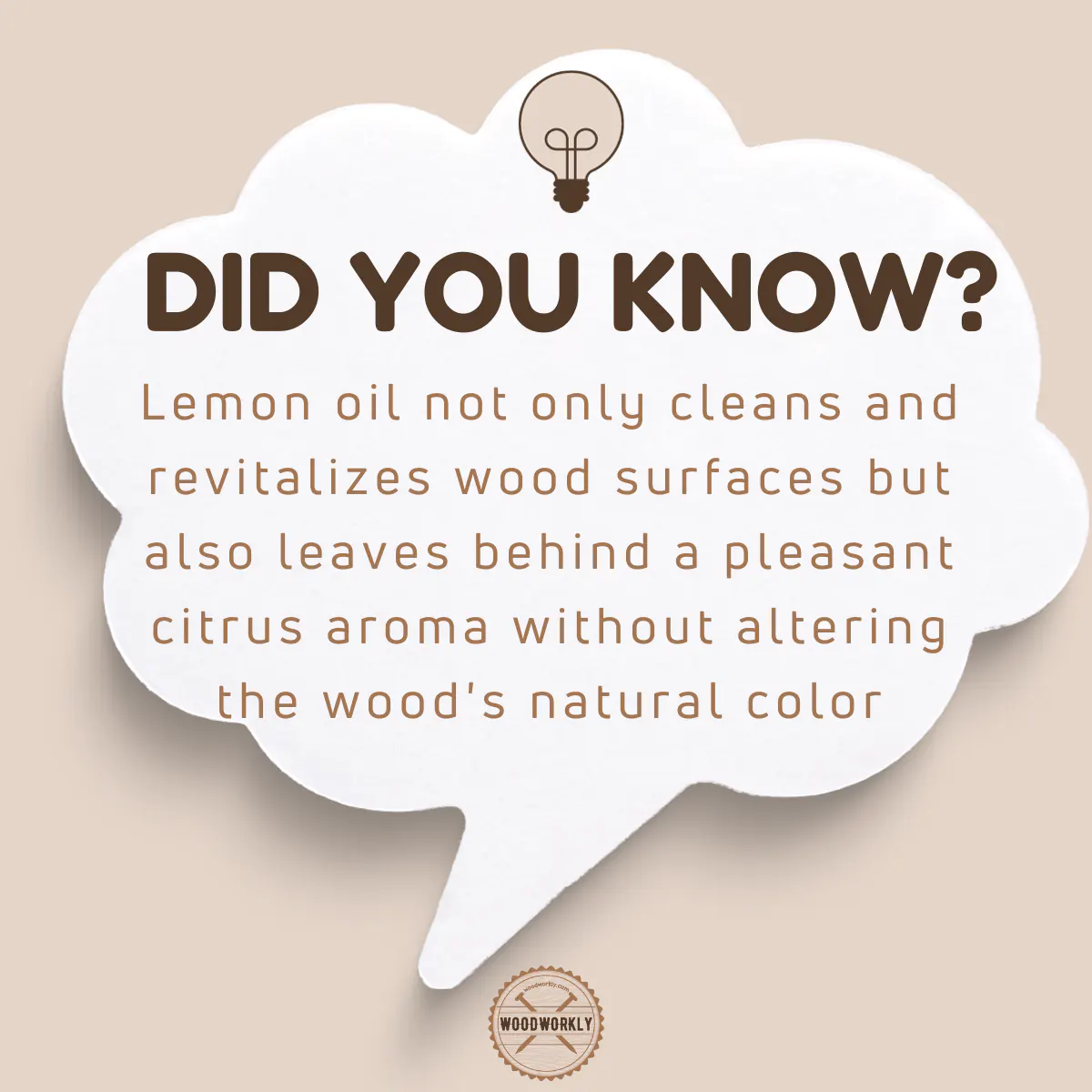
Is Lemon Oil Good For Wood
Yes, lemon oil is one of the best natural cleansings, polishing, and conditioning products for wood. It doesn’t damage the furniture and woodwork.
Lemon oil keeps moisture away from the wood surface and prevents the wood from cracking and drying out. It emphasizes the natural beauty of the wood by removing dust, dirt, stains, grease, and mold from wood.
Plus, lemon oil smells amazing. It has antibacterial agents that kill bacteria, germs, and other harmful microbial activities. It purifies the furniture surface.
Because of the above amazing cleaning and polishing properties, I personally love and most people favor using lemon oil over other artificial cleaning agents.
Lemon oil is 100% natural and does not contain any toxic or harmful chemicals inside like many other cleaning agents.
Therefore, you can use lemon oil even for kitchen furniture, woodwork, and children’s wooden toys.
Lemon oil preserves and protects the wood by bringing natural luster to the wood surface. You just have to rub the furniture surface with lemon oil using a clean cloth.
Lemon oil is basically great for any furniture or woodwork including cabinets, floors, doors, panels, cutting boards, wood carvings, and more.
There are some lemon oil products in stores with UV absorbers. UV absorbers prevent UV light from hitting the wood surface.
This helps to prevent the wood from discoloration and fading due to sun exposure.

What Does Lemon Oil Do For Wood
Lemon oil repels water and moisture and prevents wood from cracking and drying out. Plus, it also cleans and polishes wood surfaces by removing dust, dirt, grease, and stains from the surface.
Generally, every wood generates oil that is specific to its kind. For example, walnut wood produces walnut oil and cedar wood produces cedar oil.
These oils keep the wood fresh and enhance the natural luster of the wood by giving it a shiny appearance.
Oils help the wood to stay fresh without drying up due to exposure to sunlight and other environmental elements.
But over time, the natural oil production rate gets decreases due to wood aging. Because of the low natural oil concentration in wood, the freshness of the wood will be gone, and wood tends to dry up quickly.
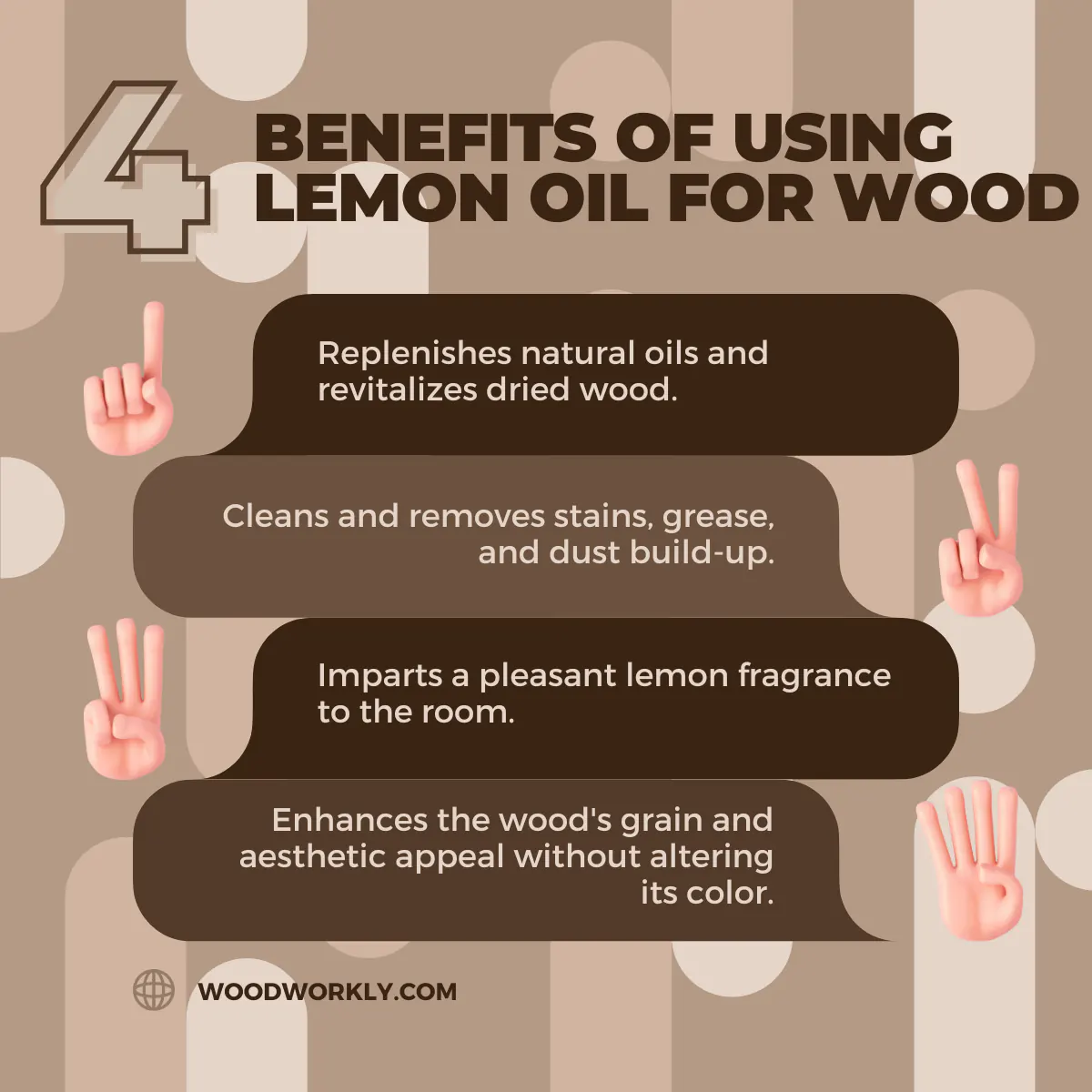
Due to the excessive dryness wood leads to cracking and splitting. This is how wood gets cracks upon drying.
In order to stop the wood from drying out and keep its freshness, you can apply lemon oil to the wood. Lemon oil stop wood from drying out and prevent it from cracking.
After applying lemon oil, you don’t have to worry about the reduction of the natural oil production rate of the wood. Lemon oil does the job.
This drying and cracking process is common in old furniture and woodwork. Lemon oil replenishes the remaining oil on the wood and revitalizes the wood.
Overall, lemon oil improves the wood’s durability by keeping the wood fresh as new for a long time.
Apart from that, Lemon oil helps to clean and polish the wood as a cleansing agent. It is one of the best natural cleaning agents on the market.
Lemon has citric acid inside which plays a key role in cleaning and polishing. Citric acid removes dirt and dust build-up from wood surfaces.
Plus, lemon oil removes stains from old furniture that is hard to remove using ordinary methods. It is a powerful cleaning agent.
Lemon oil is a strong antibacterial agent that kills germs and bacteria on the wood surface.
Lemon oil can be also used as a wood conditioner to penetrate deep into the wood and remove the dirt inside the wood. It is helpful to remove dirt that stays in tiny cracks on the wood surface.
This is why lemon oil is used even when polishing wood with vinegar. It is an excellent cleaning agent that is used in many kinds of wood.
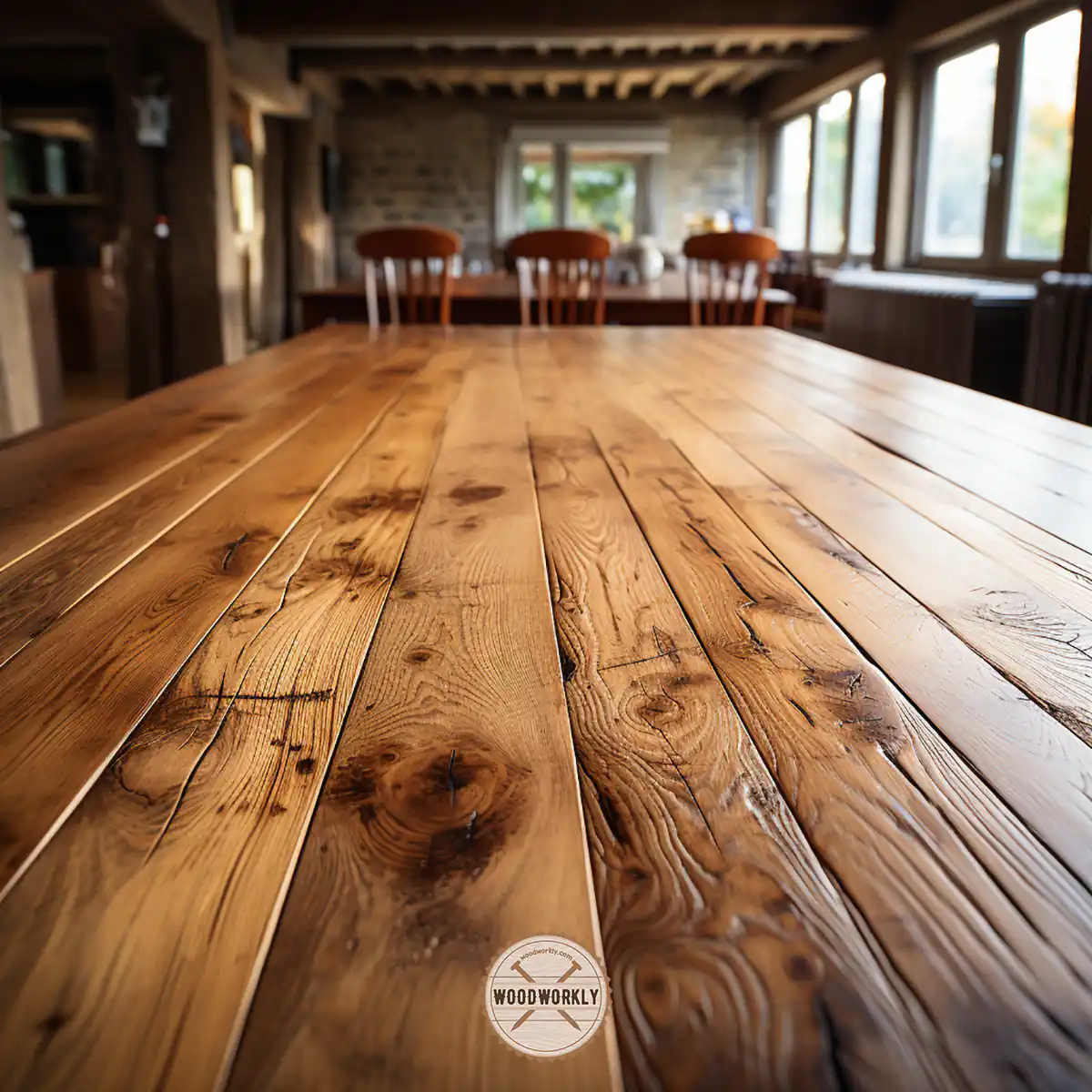
Why You Cannot Use Lemon Oil As It Is?
You cannot use lemon oil directly on wood as it is since it doesn’t make a thick film on wood upon drying.
Therefore, lemon oil is usually mixed with any other cleaning agent, conditioner, and polish.
There are so many products in the market that contain lemon oil. They contain additives.
Because of that, never use woodwork and furniture by only applying lemon oil as it is. It doesn’t build a protective layer on wood as other finishes.
It only helps to repel moisture and provides little water resistance to the wood. it doesn’t protect the wood from other weather elements.
You should frequently apply lemon oil on wood since it doesn’t make a film on wood upon drying. Otherwise, the moisture resistance will fade over time.
Always make sure to pair lemon oil with any other conditioner or polish before applying it on wood to get maximum protection from moisture, UV light, and other elements.
Lemon oil can be used on wood as it is only for cleaning and polishing purposes. You cannot finish wood only by applying lemon oil as it is.
Now you know, Hmm Lemon oil is great but It cannot do everything.
“In every seed of good, there is always a piece of bad”
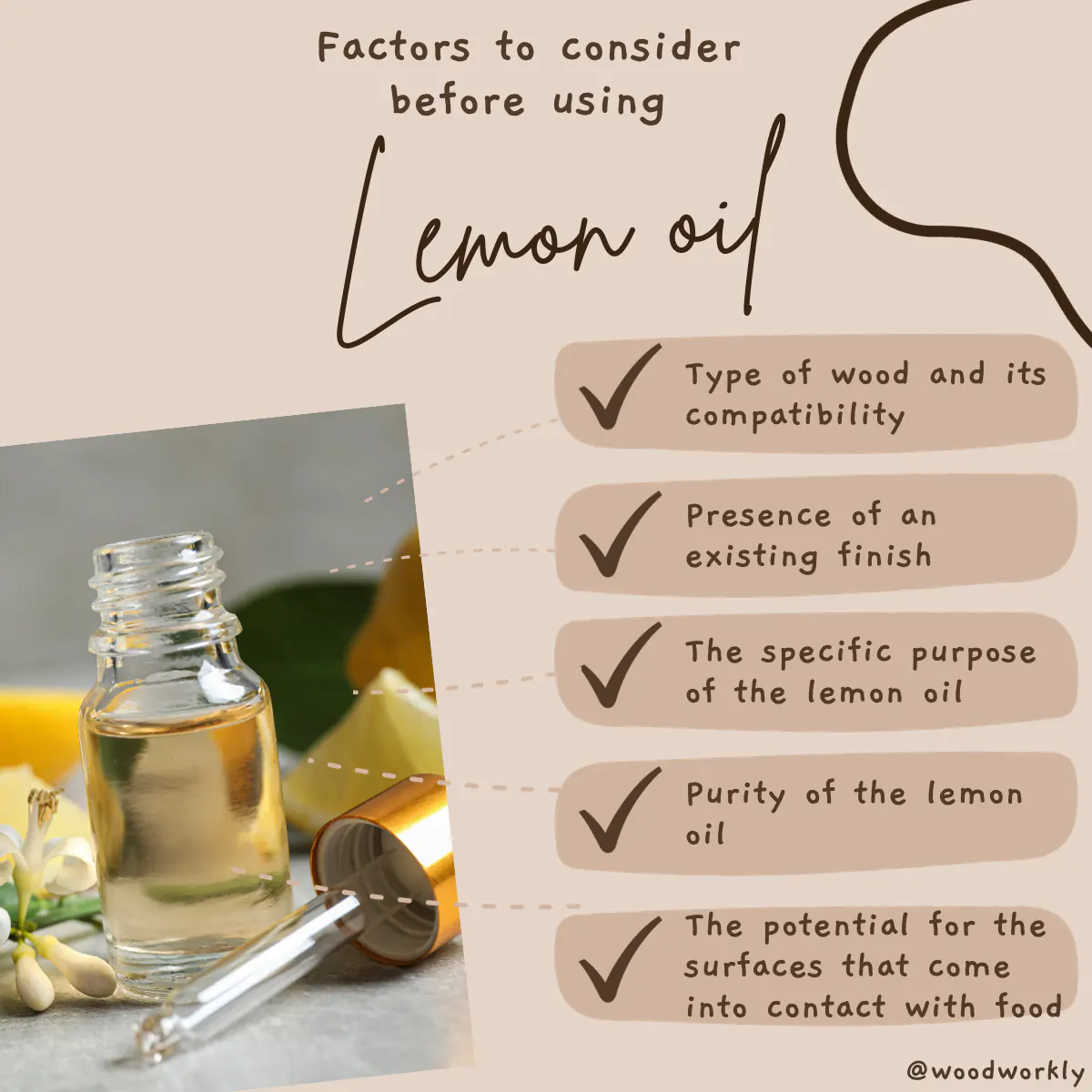
In order to make this clearer, let’s discuss some advantages and disadvantages of using lemon oil.
Pros And Cons Of Using Lemon Oil On Wood
| Pros | Cons |
| Cleans and Polish the wood | Unable to finish wood only by applying lemon oil as it is |
| Protect wood from mild moisture | Doesn’t make a protective dry film on wood |
| Revitalize dried wood | Cannot use on any wood |
| Replenish natural oils of wood | Remove old finishes due to the acidic nature |
| Smells amazing | Cannot use on antique furniture due to the excessive abrasion |
| Non-toxic | Need to apply frequently |
| Food safe | |
| Eco-friendly | |
| Restore the depth of grain and enhance the wood appearance |
As you can see lemon oil is great for cleaning and polishing wood. But when it comes to protection it doesn’t provide much and you should pair it with another polishing or finishing agent.
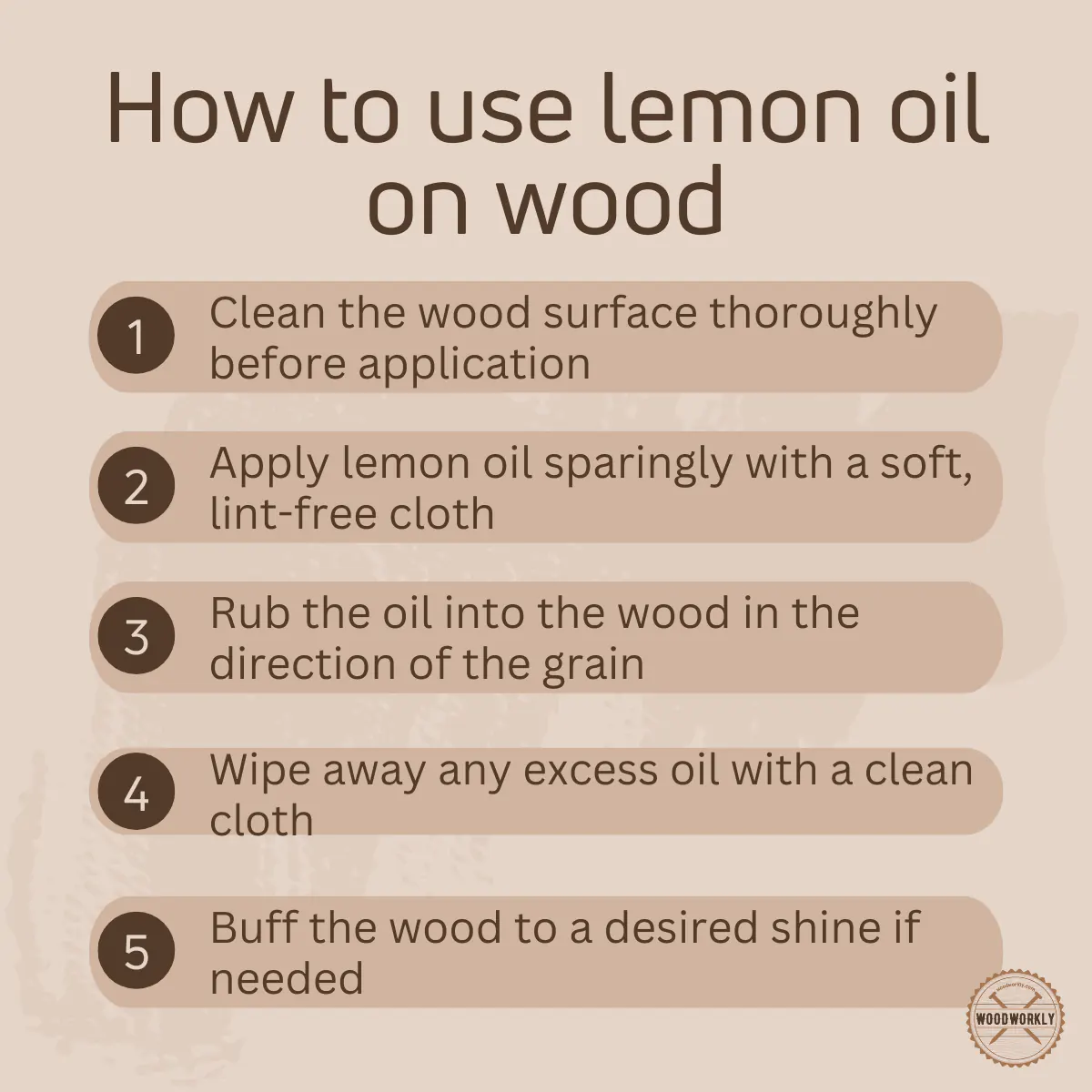
Let’s see how to use lemon oil on wood using proper techniques.
Supplies You Will Need to Use Lemon Oil on Wood
- Lemon oil
- Olive oil
- Vinegar
- Cotton cloth
- Tablespoon
- Jar with lid
- Lean rags
- Fork
Grab the above supplies from quality manufacturers dn get ready to use lemon oil for wood.
How To Use Lemon Oil On Wood
You can use lemon oil on wood quite easily. No buffing is needed. You just have to wipe away to clean the wooden surface and give it a fresh look.
Here’s the procedure for using lemon oil on wood,
- Clean the surface
- Make lemon oil for wood furniture
- Test on a small area
- Wipe the furniture
- Let the surface dry
So, let’s discuss each of the above steps in detail to get a good understanding of using lemon oil on wood properly.
1. Clean The Surface
First, clean the wooden surface well using a clean rag. Remove dust and dirt covering the whole wood area without missing any spots.
Lemon oil attracts dust. Therefore, the surface needs to be nice and clean before the application of lemon oil. Otherwise, the dust gets stuck inside the lemon oil mixture and the cleaning process gets messed up.
If the furniture is too dirty or filled with lots of dust, use a vacuum cleaner or use a dust collection pipe system to clean the surface.
2. Make Lemon Oil For Furniture
Lemon oil cannot be used on wood as it is since lemon oil does not make a protective film when drying. Therefore, you’ll have to apply lemon oil on wood frequently to keep the surface moisture-resistant.
By pairing lemon oil with some other conditioner or polish, it will make a mixture that makes a film on the wood surface upon drying.
This helps to increase the wood’s durability by protecting the wood from moisture and water damage more than lemon oil single-handedly.
Here’s how to make a lemon oil mixture for furniture,
Mix two parts of vinegar, and 2 parts of olive oil with 1 part of olive oil and mix them completely using a fork for a couple of minutes in a jar. Then airtight and close the lid. keep it at room temperature.
Or use ½ cup of distilled vinegar, ¾ cup of olive oil, and 1 tablespoon of lemon oil and mix them well using a fork for a few minutes.
Since olive oil and vinegar don’t mix well with each other, you’ll get a thick solution.
This thick solution is what helps to make a thin layer on the wood surface after applying the lemon oil mixture to the wood.

3. Test On A Small Area
Now it’s time to test the prepared lemon oil mixture on wood. Before opening the lid, shake the bottle or container well to mix the olive oil and vinegar solutions with lemon oil.
By testing, you’ll be able to get an idea about how lemon oil reacts with the wooden surface and minimize the mistakes that are about to happen during the application step.
Dip a cotton cloth in the lemon solution and wipe on a small inconspicuous area of wood to check its compatibility with the wood or with the wood finish. You don’t need to rub.
If there are no negative effects on the tested area, you’re good to go for the application step.
Congratulations on the progress you made!
4. Wipe The Furniture
Dip the cotton cloth in the prepared lemon solution do wring to remove excess from the cloth.
We just need to moisten the wood with lemon oil solution, oversaturation slows down the drying time and won’t give a satisfying result.
Then wipe the furniture surface in a circular motion along the direction of the wood grain to clean the wood surface properly and remove the remaining dirt and stains from the surface.
This polishes the wooden surface pretty well by giving a shining effect on the wood with a fresh appearance. Stains on old furniture will be easily removed due to the acidity of lemon oil.
You can add more lemon oil to the cloth while doing this. Wipe the furniture completely once you fully covered the surface with lemon oil.
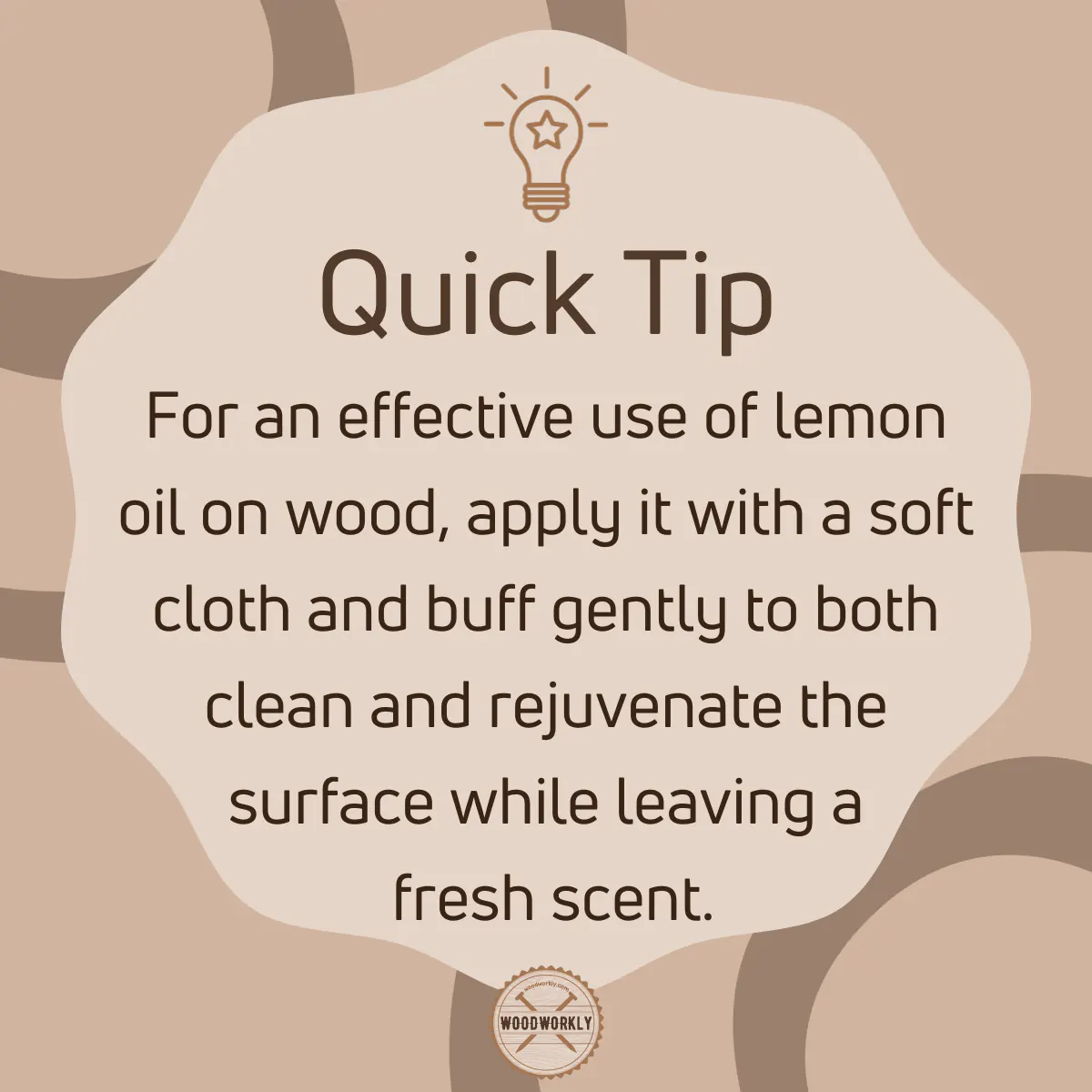
5. Let The Surface Dry
Now let the lemon mixture dry well for 15 – 20 minutes. this can take a few hours depending on the weather you live in.
The Lemon oil mixture will build a thin film on the wood surface upon drying. This helps to protect the wood from mild moisture. It revitalizes dried wood and replenishes the natural oils of wood.
Once the lemon mixture is fully dried, apply a quality wood finisher or sealer on the furniture surface to get better protection from outside elements such as UV light, insect attacks, humidity changes, temperature fluctuations, and more.
Best Lemon Oil For Wood
Here are some of the best lemon oil products for wood,
- Old English Lemon Oil Furniture Polish
- Howard Lemon Oil
- Weiman Lemon Oil
- Maintex Lemon Oil
Make sure to read the label before purchasing lemon oil. It should mention that the product is good to use on furniture or wooden surfaces.
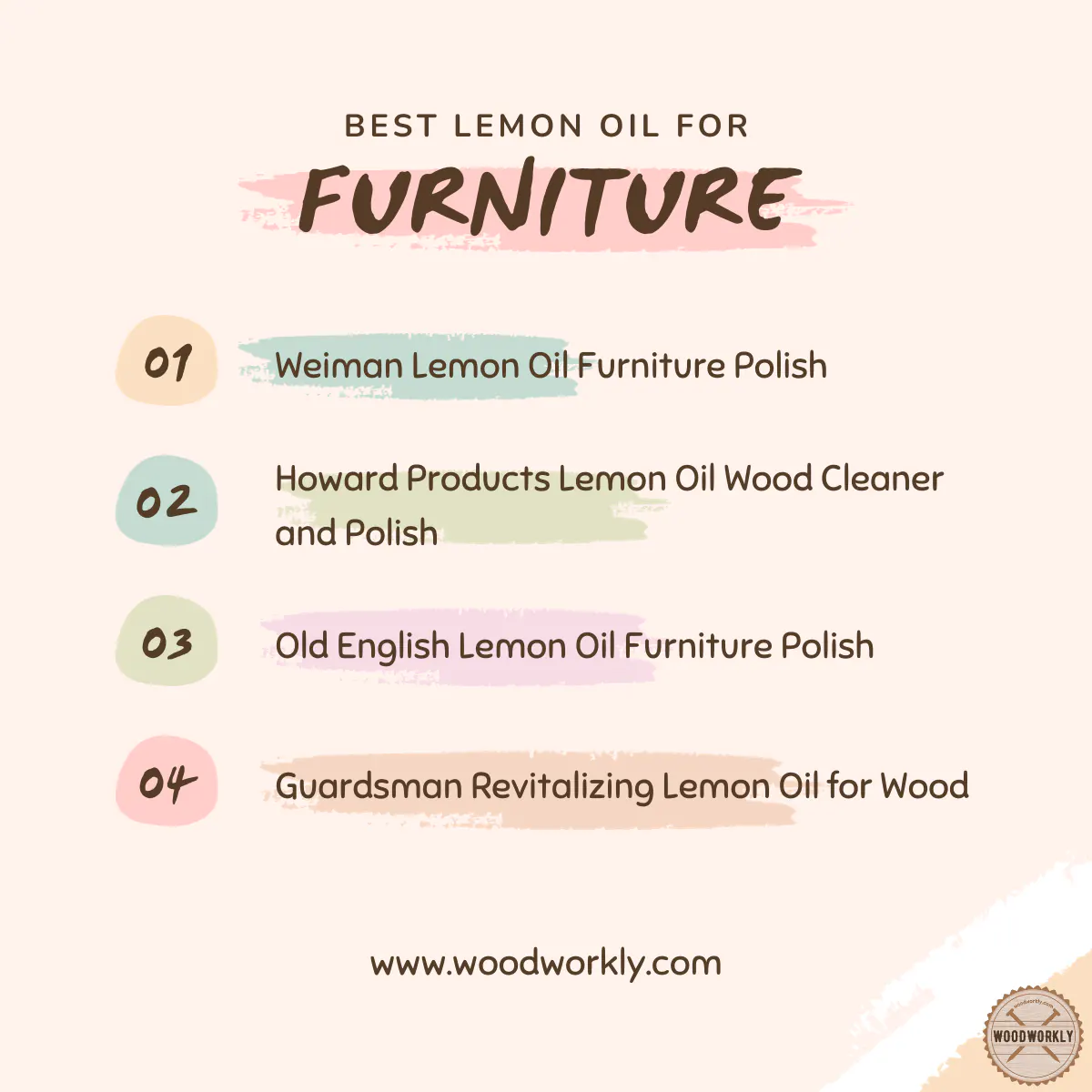
Lemon Oil for Wood Cabinets
Preserving the integrity of wood cabinets and preventing them from rotting is a concern for many homeowners.
Rot in wood cabinets can occur due to prolonged exposure to moisture and the lack of proper maintenance.
While the article provided specifically talks about lemon oil as a finish and its use in cleaning and revitalizing wood, its application can also extend to wood cabinets with similar benefits.
Lemon oil, when used on wood cabinets, can help in several ways to keep the wood from rotting:
1. Moisture Barrier
Lemon oil can act as a barrier against moisture. By penetrating the wood, it helps to replenish the natural oils lost over time, which can create a protective layer.
This layer reduces the wood’s susceptibility to absorbing moisture, which is a primary cause of rot.
However, as noted in the article, while lemon oil provides some level of moisture protection, it may not be as effective as other specialized oil finishes.
Therefore, it might be best used in conjunction with other protective measures or products.
2. Cleaning Agent
The citric acid in lemon oil gives it cleaning properties that can help remove dirt and grease build-up.
Keeping the cabinets clean can also reduce the likelihood of moisture retention and subsequent wood rot.
Dirt and grime can trap moisture against the surface of the cabinets, promoting decay.
Regular cleaning with lemon oil can keep the surfaces of the wood cabinets free from substances that might otherwise hold moisture.
3. Preventing Drying and Cracking
Wood that becomes too dry can crack, creating crevices where moisture can enter and rot can begin.
Lemon oil helps to maintain the proper moisture balance within the wood, preventing drying and cracking.
This makes the wood less prone to the kinds of damages that can lead to rot.
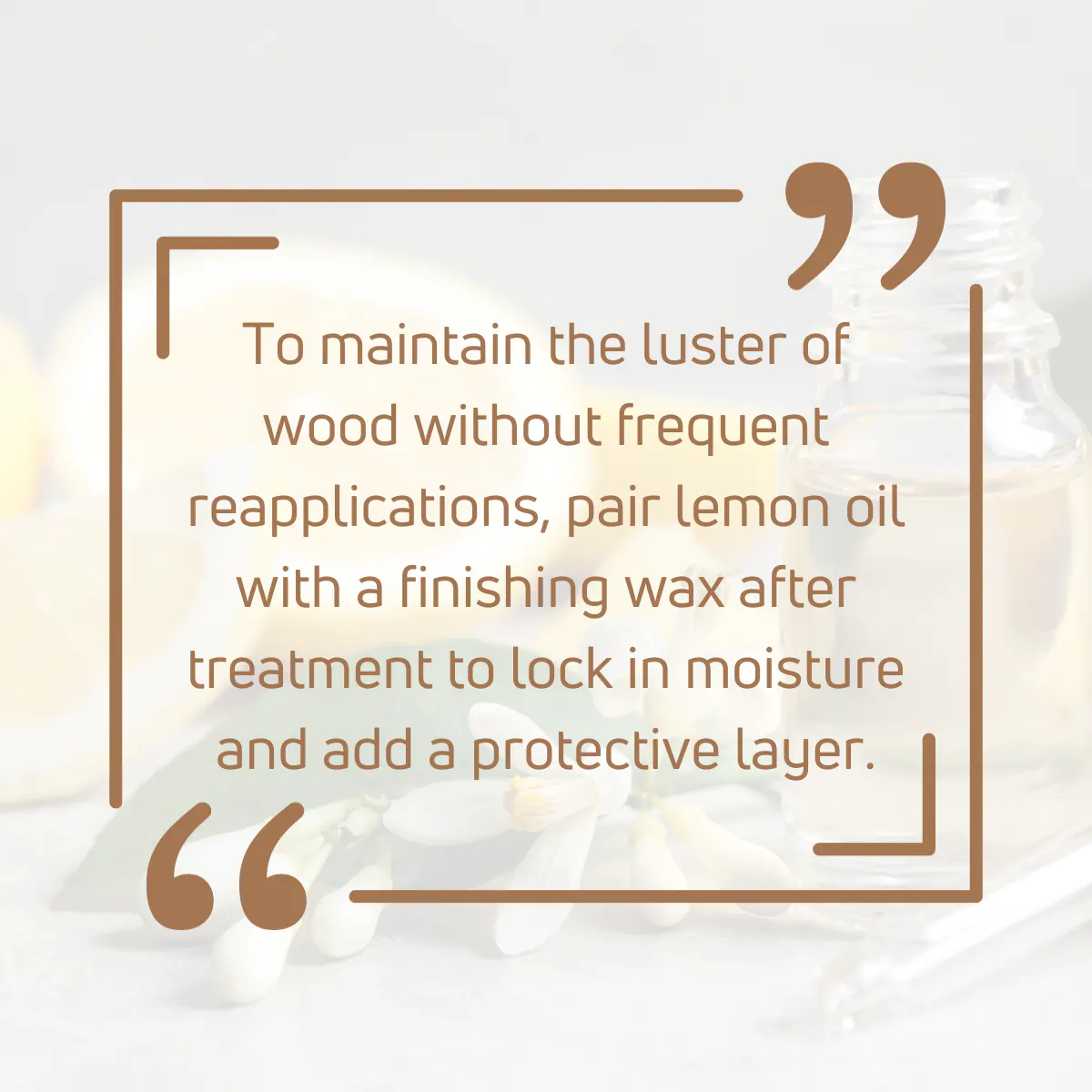
4. Aesthetic Maintenance
Beyond the practical aspects of preventing rot, lemon oil can enhance the appearance of wood cabinets by making the grain “pop” and giving the wood a rejuvenated look.
This visual enhancement does not directly prevent rot but can make any developing issues more noticeable, allowing for early detection and intervention.
5. Non-Toxic Nature
Given its non-toxic nature, lemon oil is a safe option for homes, reducing the need for harsh chemicals that might break down wood fibers over time or contribute to unhealthy indoor air quality.
6. Compatibility with Other Finishes
As mentioned in the article, lemon oil doesn’t dry to a film and gets absorbed by the wood.
If additional protection is required, especially in high-moisture areas like kitchens, lemon oil can be used as a base before applying a sealing finish, such as wax, which can add another layer of protection against moisture and wear.
Limitations and Considerations
While lemon oil has its advantages, it’s also important to be aware of its limitations.
It needs to be reapplied periodically to maintain its protective qualities.
It may not be suitable for all types of wood cabinets, particularly if they are antique or have a pre-existing finish that could be compromised by the acidity of the lemon oil.
Lemon Oil for Wood Floors
When it comes to maintaining wood floors, particularly those made from pallet wood, ensuring their longevity and preventing rot is essential.
Pallet wood, often being reclaimed or having served in shipping, can be more susceptible to rot due to its previous exposure to various elements.
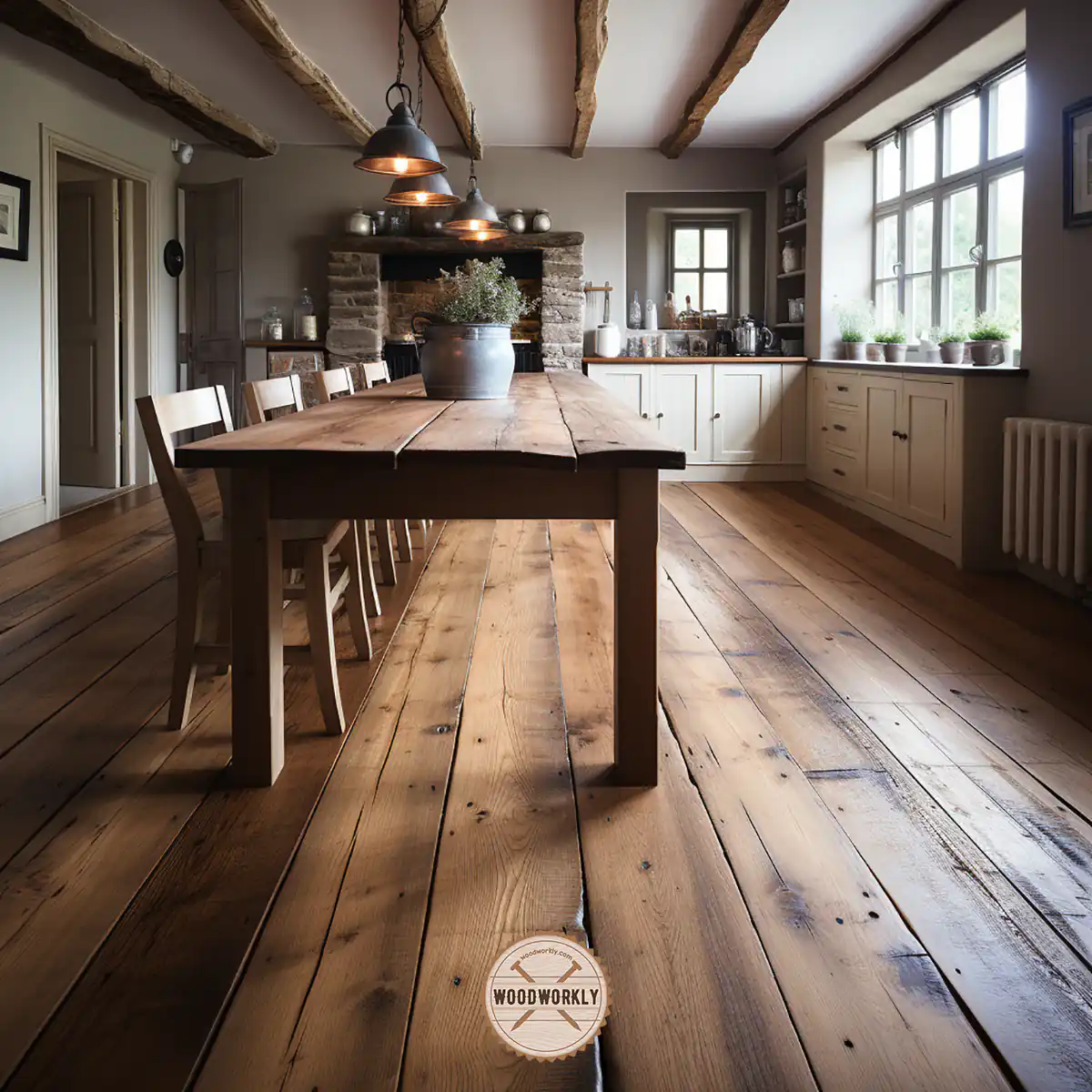
The application of lemon oil for wood floors, as gleaned from the given article and additional sources, can contribute beneficially to the preservation of such wood when used as part of a maintenance routine.
Protection from Moisture
Lemon oil can infuse pallet wood floors with a light barrier that guards against moisture penetration.
This is crucial since moisture is the primary cause of wood rot. The oil helps to replenish the wood’s natural oils, which can be lost due to environmental factors and aging.
However, given that lemon oil is not the most robust barrier against moisture, it is often recommended to supplement it with more potent sealants, especially in areas with high moisture exposure.
Replenishing Natural Oils
Pallet wood floors may have been subject to harsh conditions, leading to a depletion of their natural oils.
Lemon oil can revitalize these woods by restoring some of the natural moisture, which helps to prevent the wood from becoming brittle and cracking, conditions that predispose the wood to rot.
Cleaning and Maintenance
The citric acid present in lemon oil has natural cleaning properties that can aid in the removal of residue and build-up that could trap moisture against the wood floors, contributing to rot.
Regular cleaning with a lemon oil-infused product keeps the floors free of debris and can help in preserving the integrity of the wood.
Aesthetic Preservation
Lemon oil not only serves a protective function but also enhances the appearance of pallet wood floors, making them look well-maintained and vibrant.
While this doesn’t prevent rot directly, a well-kept floor is more likely to receive attention and care, which contributes to its overall well-being.
Safety and Compatibility
Lemon oil is a natural, non-toxic product that is safe to use in homes.
This aspect makes it a favorable option compared to harsh chemicals that may degrade wood over time.
Additionally, because lemon oil doesn’t create a film on the wood, it can be used in conjunction with other products that offer a stronger protective layer, such as polyurethane or wax, to provide a more durable finish that can further help to prevent rot.
Frequent Reapplication
One of the drawbacks of lemon oil, as noted in the article, is its need for frequent reapplication to maintain its benefits.
For floors, this might translate into a more regular maintenance schedule compared to other finishes.
Usage Limitations
The use of lemon oil on wood floors must be considered carefully, as it may not be suitable for all types of wood or finishes.
Some floors may require a finish that provides a harder, more impermeable barrier, particularly in high-traffic areas or in commercial spaces where the floors undergo significant wear and tear.
That’s it, folks! Hope you have gained good knowledge about using lemon oil on wood without making any mistakes.
Does Lemon Oil Attracts Dust?
Yes, lemon oil attracts dust. Keep the lemon oil in an airtight container and clean the surface regularly to remove dust.
Apply lemon oil frequently on the wood to maintain a fresh appearance on wood by cleaning and polishing the surface.
Can You Use Lemon Oil On Antique Furniture?
No, Never use lemon oil on antique furniture since too much abrasion can damage the wood. The acidity of lemon oil damage antique furniture.
Use a minimal amount of lemon oil on antique furniture and wipe to restore the original gloss on the wood by replenishing the wood effectively.
Apart from using lemon oil, you can use natural oils and waxes with no acidity. Tung oil works great on antique furniture.
Better to call professionals when restoring antique furniture since they are high in value and some antique furniture will not go well with finishing oils.
What Wood Can You Not Use Lemon Oil On?
- Antique furniture
- Maple fretboard
Lemon oil cannot be used on the above woods due to high acidity and lemon oil tends to change the color of maple fretboard oiling maple fretboard is not really necessary.
How Long Does It Take Lemon Oil To Dry?
Lemon oil dries within 15 – 20 minutes after the application. This takes much longer time due to the humidity of the outside environment.
When the lemon-oiled surface no longer shines in the light, you can consider it as dried.
Better to keep the lemon-oiled surface for at least one hour before finishing since some areas dry slower due to the excess lemon oil on the surface.
Does Lemon Oil Darken Wood?
No, lemon oil does not darken the wood. It only enhances the wood’s appearance by revitalizing dried wood and replenishing the natural oils of the wood.
If you’ve noticed lemon oil darkens the wood, it may be because of the artificial chemicals and additives that were included during the manufacturing stages.
Use quality lemon oil products to keep your furniture from discolorations upon age.
Can You Use Lemon Oil On Painted Wood?
Apply a minimal amount of lemon oil on painted wood since the acidity of lemon oil can damage and remove the existing finish on the wood. It can peel off the paint.
Clean the painted furniture with lemon oil in a very small amount. It helps to remove dust and dirt and polishes the painted wood properly with mild moisture resistance.
Is Lemon Oil Safe For Wood?
Yes, lemon oil is safe for wood. it removes dust, dirt, grease, and old stains from wood and enhances the wood’s appearance by providing mild moisture resistance.
Lemon oil is a natural, eco-friendly product that can use for any furniture including cutting boards, cabinets, and other woodwork.
Let’s answer some frequently asked questions.
FAQs
Can lemon oil be used on all types of wood furniture?
Lemon oil is generally safe for most types of wood furniture, but it’s not recommended for use on some fine antiques or woods that are sensitive to acidic substances.
How often should lemon oil be applied to wood?
Lemon oil should be reapplied to wood surfaces as needed, but generally every few months or when the wood appears dry and dull.
Will lemon oil change the color of my wood furniture?
Lemon oil typically enhances the natural color and grain of wood without significantly changing its color, though it may darken some lighter woods slightly.
Can lemon oil be used to protect wood from moisture?
Lemon oil can provide a light barrier against moisture but should be supplemented with a stronger sealant for areas with high moisture exposure.
Is it safe to use lemon oil on kitchen utensils and cutting boards?
Pure lemon oil is safe for kitchen utensils and cutting boards, but always check the product label for suitability and additional ingredients.
Does lemon oil repel insects from wood furniture?
Lemon oil has a fresh scent that may deter some insects, but it is not a certified insect repellent for wood furniture.
Can lemon oil be applied over other finishes?
Lemon oil can be applied over other finishes as it doesn’t form a hard film, but always test on a small area first to ensure compatibility.
Did I cover all you wanted to know about: Using lemon Oil On Wood
In this article, I deeply discussed, why lemon oil is considered one of the best cleansing agents for wood and how to apply lemon oil on wood properly to clean and polish the wood.
Lemon oil works perfectly on wood by revitalizing dried wood and replenishing the natural oils of wood. It removes dust, dirt, and grease on the surface and prevents wood from cracking by keeping the wood fresh and avoiding dryness. Lemon oil gives a sparkling shine to wood furniture, and it smells great too.
Furthermore, I’ve answered some frequently asked questions as well.
Hope you learn everything you need to know about using lemon oil on wood. Try to apply lemon oil on wood when cleaning and polishing wood and get the sparking effect that you haven’t gotten from any other cleaning product.